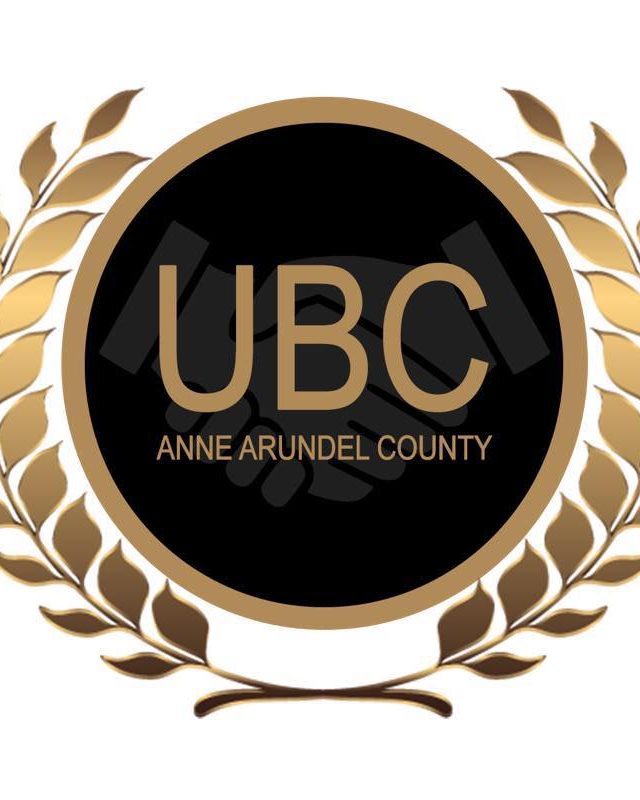
United Black Clergy of Anne Arundel County Organizes Souls to the Polls
Election Day in the 2022 midterm elections is fast approaching on Tuesday, November 8th. For many, voting in this election is more than civic engagement: it is a way to protect their bodily autonomy after the overturning of Roe v. Wade, or to protect our democracy against misinformation campaigns and the evils of white supremacy.
For decades after African Americans finally got the right to vote, African American communities and organizations have been fighting systemic racism and disenfranchisement to include their voices in every election. One particularly well-known initiative is Souls to the Polls: started by African American congregations in Florida in the 1990s, Souls to the Polls is one of many ways that African American communities have organized their voters to make their voices heard.
In Anne Arundel County, MD, the United Black Clergy (UBC) is one of many organizations across the nation continuing this legacy of civic engagement, community, and resistance to oppression. This month, our digital content director and blog editor Emma Buchman sat down with the president of the UBC and longtime friend of the Foundation Bishop Antonio Palmer. His congregation at the Kingdom Celebration Center in Odenton, MD is one of many taking part in this local Souls to the Polls campaign.
If you would like to participate in Souls to the Polls Anne Arundel County, whether to volunteer or to vote, please contact Bishop Palmer: 410-672-2006.
— –
Emma Buchman (Digital Content Director & Blog Editor, March On Foundation):
Thank you again so much for taking the time. First, could you just tell me a little bit about yourself? Who are you and what do you do?
Bishop Antonio Palmer (President, United Black Clergy of Anne Arundel County):
I’m Bishop Antonio Palmer, the President of the United Black Clergy of Anne Arundel County, which comprise of 55 clergy members throughout the state of Maryland. It used to be just Anne Arundel County, but we’ve extended our reach to South Baltimore and also the Eastern Shore. And we have some prospects–clergy prospects–in Prince George’s County and Montgomery County now; so, hopefully, they’ll come in as well.
But our organization, pretty much started because, of course, we have disenfranchised communities that we wanted to make sure that we helped, be a voice for the voiceless, those who have been ostracized and turned away… where we can galvanize and come together to make sure that we can approach the powers that be to make some effective changes – hopefully make some effective changes.
So that’s what the United Black Clergy is: it’s a group of clergy members that’s doing civic engagement and not just the religious aspect of who we are. We want to help make some social changes because as people, we all experience the same thing, and it’s not just spiritual. There’s a holistic approach that we must take to help humanity.
I always say that Jesus paid the full price for the total person, so we have to look at not just the spiritual side of things, but social, domestic, financial, etc., the wholeness of man. So, that’s our aim.
Emma:
When was the United Black Clergy founded?
Bishop Palmer:
Ooh, that’s a good question: 1983. I would say from 2010 to maybe about five years ago it flatlined, if you will; and Apostle [Larry Lee] Thomas and I resurrected it, if you will, brought it back, thought it’d be best to bring it back together and formulate again, which we did. That was in 2017 when we got back together; and we’ve been mobilized ever since.
Emma:
Why are the 2022 midterm elections so important to UBC?
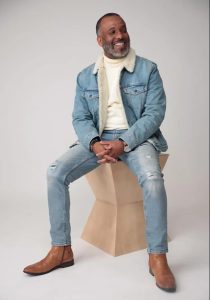
Photo credit: Kingdom Celebration Center
Bishop Palmer:
Well, number one: every election is important to us; this one we believe, because of what we faced six years ago with the presidential election, which disseminated down to the local people in office. So, we wanted to ensure that the Black agenda will be considered, and those who will be in office will actually consider and help the communities that [have] been overlooked. Every election is important because we have to be able to galvanize and get people to vote for those who are going to be in office who will actually consider helping those who are in need.
I believe that this election is important because we have good candidates that are running, who have committed to the agenda that we see; and then there are candidates who are running who don’t necessarily feel like they need our vote or attention. So we have to make sure we inform those who have the right to vote, that they will vote for our values and the help that we need to get things more to an equitable society.
Emma:
Just could you tell us a little bit about Souls to the Polls?
Bishop Palmer:
Yes, Souls to the Polls, of course, is not something that we thought of, but the whole idea and concept is great. It started back in the early ‘90s down in Florida with a church that decided that they were going to have a caravan and take their parishioners to the polls on a Sunday. Since that point happened, every election, the church has picked up on it. And this, of course, was the Black church (if you want to call it the Black church, church is church); but churches with predominantly Black congregants began to also pick up on it. So that’s been something for every election to try to galvanize and bring people together, parishioners primarily, and get them to the polls on a Sunday.
Now we’ve extended that out to reach the larger community and not just the church community. So that’s what Souls to the Polls is.
Now here, in Anne Arundel County, the United Black Clergy has taken the mantle of ensuring that Souls to the Polls will continue to exist here locally. Now that we are approaching the General elections here, matter of fact, this Sunday [October 30], we’re having our Souls to the Polls campaign for the churches here at Anne Arundel County. For this Sunday we’ll be taking our congregants caravanning to the polls for early voting. And then of course on Election Day, on November 8th, we’ll be doing the same. And if anybody calls during the week for early voting and still need a ride to the polls and want to make sure that they vote, they can give us a call and we’ll still try to make things happen.
Emma:
There have been attacks on Souls to the Polls, like trying couched ways to limit that. Why would you want to limit people trying to get people to go out to vote?
Bishop Palmer:
Well, there are some people who are in power that want to stay in power, knowing that the Black vote is very important and can swing an election. And we’ve seen it happen: when Obama was running and he won; and there was a great showing in Georgia with Senator [Raphael] Warnock and how the Black voters came out in great number.
There’s going to be voter suppression and manipulation that’s going to take place. So our whole thing is to concentrate on: whatever they throw our way, that we will have a different plan, a strategy to make sure that we get people to the polls. So come what may, like we say in the Bible, come what may…
Emma:
What do you think makes Souls to the Polls a successful tool to promote civic engagement and voter turnout?
Bishop Palmer:
So, even though Souls to the Polls is that physical action of getting people to the polls that may not necessarily have rides and things like that, the education of it starts before Election Day and early voting. Whether we’re educating our parishioners or whether we’re in the communities talking about voting, that’s the number one thing — it keeps the church engaged, hopefully throughout the whole four years and onward. But it keeps us engaged in this whole process.
And hopefully our children will take that and what they’re learning about voting and so forth, they’ll take that and continue to learn and teach others. If we look even as far as 10, 15, 20 years ago, it wasn’t as much conversation in the Black community about voting as it is now. So we believe that we’re making headway.
We’re looking for those good candidates, those good people who can actually see the Black agenda, see that there are situations and needs that are out here. How can we make the society more equitable? Are you willing to fight not just for yourself, but for the causes of those who are in need?
There’s still a struggle because there are a lot of people who are working, I don’t call it 9 to 5s, I call it 9 to 9s, that are in the Black community working hard jobs… So now we’re dealing with getting the right candidates in office where it would really motivate somebody who’s working hard, who you have to convince that I’m going to take time out of my day or out of my work day (or even to sit there and just fill in the little blanks if I’m going to do a mail-in ballot), to really get them to see, you know, “Why should I vote? Who am I voting for?”
So now we’re at the point where we’re looking to raise up, if you will, raise up candidates. And there aren’t as many African Americans who are looking at being candidates, whether it’s on your local county council, or city council, or having a desire to become a county executive or a state delegate and so forth. So now we’re trying to really share the whole idea that, hey, if you are 18 and you’re going to school and you’re going for political science, think about actually running for office after you do your school biddings there. That’s where we’re at too.
And then those who’ve done all that, we’re looking for those good candidates, those good people who can actually see the Black agenda, see that there are situations and needs that are out here. How can we make the society more equitable? Are you willing to fight not just for yourself, but for the causes of those who are in need? And that’s kind of where we’re at.
Emma:
So what is your plan for your Souls to the Polls? How are you going to execute it?
Bishop Palmer:
Right. So let me first of all say that we have a team… of different organizations that’s going to be partnering with us for Souls to the Polls; and whether they’re going to be physically there helping or whether they are contributing donations, whether it’s a gift card for gas or for the driver to get some lunch… We have the National Council of Negro Women that’s helping; we have the Transformative Justice Coalition that’s helping; we have the NAACP of course; we have the Deltas (don’t ask me which Delta, I just know the Deltas are helping!); of course, the Caucus of African American Leaders; the [National] Coalition of 100 Black Women… Different groups are coming together and saying, “What do you need? How can we help?”
Maryland Souls to the Polls [is] actually giving us a great contribution as far as funding to help us mobilize… Here in Anne Arundel County, we have four different churches that are taking the lead for North County; West County (here); Annapolis area (we call that South County); and then you have the Pasadena/Glen Burnie area there…. So there’s four strategic areas in the county where we’ll be able to go out on Election Day and set up, whether we’re going to have music, some of us are going to have a DJ there with some music. We’re going to have a food truck: show us your “I Voted” sticker and you get a free lunch from the food truck that we are providing, thanks to Maryland Souls to the Polls.
We really want to encourage our young people to come out and just experience what voting looks like, what people are saying… They need to go out and ask questions, “Well, why vote for this person?” That helps them get around the spirit of the political process.
Some of us are working with our local barbershops and we’re investing in coupons. Then the barber can say, “Hey, here’s a $5 off coupon, bring this back with your ‘I Voted’ sticker and you get $5 off of your next cut,” or whatever the case is. Because we found out that more Black women vote than Black men; we’re trying to get the Black man out to vote. So we thought that the barbershop, and that was actually Carl [Snowden] had thought of that idea, which actually stemmed from Georgia, they’re doing something similar to that. So we wanted to pick up on that idea.
So those were some of the things, some incentives to motivate people to come out and to vote… We do have gas cards to help with the gas for the church vehicles, vans and so forth. And we also, for the drivers, we want to make sure we provide lunch and so forth for them as well. So that’s some of the strategy that I can think of more immediately. And of course voting is from 7:00AM to 8:00PM or something like that, so we’ll be out there at least most of the day, if not the whole day…
And then on Sunday, to encourage our parishioners, we’re caravanning to the polling site… going voting and then we’re going to come back to the church and have a party, food party or whatever you want to call it. So we’ve encouraged the other pastors to do that as well.
We’re trying to get them to the polls. Our number one priority really was mail in ballots and early voting, we were encouraging our congregants to do that. But again, if that wasn’t done, then we are providing the opportunity to go on Sunday and then for Election Day…
Emma:
What do you hope to accomplish with Souls to the Polls, what will define it as a success?
Bishop Palmer:
Well, for the primaries, it was a very low turnout: 17% of African Americans who were registered to vote voted in the primaries. We feel it is our responsibility to try to really double or triple that number if we could… Success would be that those who see our agenda, that are willing to help the needs of the people, will be in office… Success would be that there’s a much greater participation in turnout in voting during this General election… And again, ongoing dialogue about the process, about the power of the vote. And so to us that’s success.
Emma:
Awesome. Is participation limited to congregants or…?
Bishop Palmer:
Oh no! Like I said, we already have different organizations that are participating, whether they’re donating or whether they’re physically going to be there to help out… But you don’t have to be a part of the congregation – you can be friends, family, loved ones, enemies! Anybody can come out and help out…
We really want the youth. And I say youth… I want to be considered young, but the younger generation, we just want them to really be around, hang out with us, see what goes on. So we really want to encourage our young people to come out and just experience what voting… looks like, what people are saying. Others are going to have their tents out and screaming out who to vote for and all that. They need to see all that. They need to go out and ask questions, “Well, why vote for this person?” And so forth. And that helps them get around the spirit of the political process.
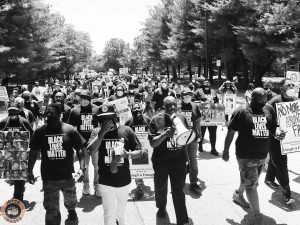
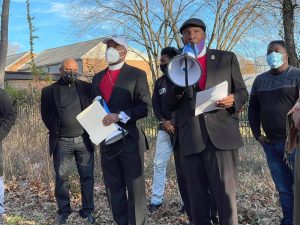
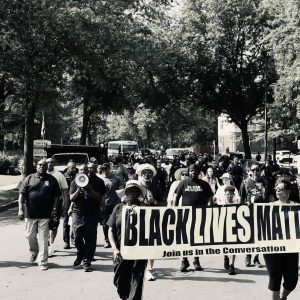
Members of the United Black Clergy, including Bishop Antonio Palmer, Bishop Larry Lee Thomas, and Rabbi Randy Curtis.
Emma:
Awesome. Is there anything else that the UBC is up to that you’d like people to know about?
Bishop Palmer:
This has really been a primary concentration right now, and it’s taking a lot of work, strategizing and getting people together and formulating what we have even now. So afterwards, we’re going to be sitting down after the election with whoever wins and ask them, “What is their vision?” For instance, whoever becomes the new county executive, “What is your vision for the next four years for our county? And how can we work together with you?”
Again, we’re nonpartisan, so whether it is a Republican or Democrat that wins, we still have to work and still have to push and still have to fight. Because even with the person that we had in the office for the last four years, some things we’re still fighting for and pushing for. So really at the end of the day, it’s about the person’s heart who’s in office, and can they really see what we see that can help strengthen our county, the betterment of our society? That’s what we’re pushing for really. We think we know who would be a better candidate, but we really don’t know at the end until we continue to just push and fight and have those ongoing dialogues to get us to a better place. So that’s going to be our next steps.
We are currently working with different agencies. One of the key things on our heart right now, our focus, is economic development for the Black community. We know that during the pandemic Black businesses suffered the most, but they’re also overlooked the most. So we’ve been…trying to come up with a solution to help some Black-owned businesses recover, and to help strengthen the Anne Arundel County Economic Development Corporation IVP Program (which is the Inclusive Venture Program), which $1.3 million went into from the American Rescue Plan funds. Out of the $112 million that was given to our county, $1.3 million went to that particular program to help the minority and women-owned businesses. I think the cohort that’s gone through the programs thus far… I think it was 57%, was African American.
So we want to strengthen the program first, as ideally we want to help recruit people to go through the program, they can help strengthen their businesses. But the program, to us, needs to be strengthened, because at the present time they’re giving out… $5,000 after this one completes, I believe it’s eight weeks of programming, and after they successfully complete the program, they are awarded $5,000 seed money. But $5,000 in today’s world…
Emma:
It’s like a dollar.
Bishop Palmer:
It’s almost like a dollar! So after you go to your Kinko’s or whatever, you go to do your flyers, get your social media marketing up, or build your website, whatever you’re going to do to help strengthen your business, that $5,000’s going to be gone and you still have rent to pay, you still have employees or someone to pay. So we want to strengthen that; at least let’s try to double that number. You received $1.3 million, what are you doing with that money? And that’s just from the American Rescue money; from the Congressional earmark there was another close to $2 million that’s being received for the IVP. So it’s like, what are you doing with the money? They didn’t know I knew that, but I knew it because I researched. But anyway, so now we’re in conversations about that.
Let’s strengthen the program. UBC, we know the businesses that are out here, and it even goes further than those that are in the Green Book with NAACP and they’re doing a great job trying to record and have a directory of businesses that are in our community. But we have even more that are not even on the Green Book. So we can recruit, that’s no problem, because we’ve heard that it’s “difficult for them to recruit.” Well, case in point: because you’ve got to strengthen the program! People don’t want to waste their time going through eight weeks of programming… and they’ve got to work and or try to strengthen their business and then you only give them $5,000.
They have to consider that. So that’s where we’re in dialogues with them. I think that we can find something suitable that can work, that can be doable for minority and women-owned businesses. I think that… a solution can be found.
We’re hoping for the best, we’re praying for the best, and whoever does win, we’re hoping that they’ll work alongside with not only the UBC but other community organizations, advocates that are out here that want to see our county really strive and thrive and be a great place for all citizens to live, all residents to live here.
Now what’s critical, Emma, is that we have an election. So all this dialogue, I wanted to get it in before, find a solution before, if anything changes. So now we’ve got to see what’s going to happen with the election, as well. But we’re still going to deal with this agency even after the election, and hopefully we can get something done. If not, then we’re going to be taken aback for spinning tires… And we don’t want that to happen.
…Things will change. And I have to admit that Steuart [Pittman] did put some things in place, some things were working pretty good. Stakeholders did have conversations, dialogue… We did move the needle towards some positive things while we are trying to get other things done. Needles were moved.
Case in point, after 35 years of fighting for a community center in the Severn area… we’re midway in the completion of the Severn Intergenerational Center. So that’s one thing that we see that Steuart actually did during his four years in office, that when people were advocating for 35 years and other county executives didn’t even really give it a time of the day or made some promises that they broke, here, this is coming into fruition. So things like that where we saw the needle moving towards the positive side for things to get done and not just say it…
So that’s where we’re at. We’re hoping for the best, we’re praying for the best, and whoever does win, we’re hoping that they’ll work alongside with not only the UBC but other community organizations, advocates that are out here that want to see our county really strive and thrive and be a great place for all citizens to live, all residents to live here. But we got a lot to tackle, affordable housing, and a lot that’s going on. But we’re going to keep hope and say we’re going to get there.
We’re going to get there (hopefully in our lifetime!), we’re going to get there.
Everybody deserves an opportunity for equality, for equal living and justice. So there’s some things that are on the front: dealing with our police department that we know we have to change… and that doesn’t even matter who’s in office. It just seems like that’s a stronghold that’s been there for ancient times that we’re… since the inception of the police department here in the county, and we’re going to have to try to break down these strongholds and build up something good where everybody can feel safe and feel like things are just with the judicial system that’s here.
We keep working and we have some great people who are advocating and that’s what I like… It’s a coalition: Black, white, Hispanic, we’re all coming together and each doing their part as best as they can to try to see things become better for all of us.
Emma:
You mentioned your contacts with all of the businesses in the community, and then also when we were talking about Souls to the Polls you referenced the barbershops. The UBC is very effective in moving the needle – how much do you think that community connectivity plays into that?
Bishop Palmer:
The number one thing is integrity. People are looking for people they can trust and that know they will fight on their behalf. That’s what we try to build up in the UBC. And with that, we’re in the communities, they know… the different churches that are out there, whether we’re doing food distribution to help with the food desert that’s in our county, or whether we’re helping here at the Family Support Center, where we’re helping teen moms complete their high school diploma, also provide career education for them to help seek and find a career.
So whatever it may be that we’re doing, they like to see that we are serving. And with that comes the power of influence, if you will, that people will say, “Hey, yeah, we’re connecting with UBC because we see the body of work that they’re doing for the communities.” And I think that that helps us. They’re seeing that we’re not doing it for ourselves, we’re doing it because we love people and we want to see things change and be better.
We have people that are in our organization and in our congregations who have gone through different challenges of life. There had to be a point before we met Jesus where we were radical in the wrong way! And so we try to take that, to understand and relate to those who may be struggling and going through different challenges in life.
So for example, before I met Jesus and He helped me turn it around, I knew what it meant to struggle and to go out here and break the law, because you’re trying to get some money or advance and make things lighter. So we understand things like that. We understand even if you’re not breaking the law, but just the challenge of not having enough and how burdensome that can be. And we try to keep that before us as we’re serving.
There are some essential, basic needs for all humanity… We know if those needs aren’t met, you are tempted to try to get them met and maybe in the wrong way. So we’re out here to try to encourage and lift up people’s heads and let them know that, hey, we struggle too, and there’s a better way that we can get some things done.
It helps motivate us to serve, to know that, hey, if we’re providing a meal for the week, we’ve structured and formulated that so that whoever is coming through those lines, they’re coming because they’re in need. They can utilize what they may have been going to the grocery store, the $200-300, use that for something else, the utility bill or whatever the case is. But now at least you have some groceries for the week. And then your child could be fed that may have gone to school hungry, but now he’s got some Cheerios or something.
So those are some of the things that we take joy in seeing that we’re helping, and we think that that is a help in a big way.
And then if it’s something else – whether it’s, again, fighting economically for our businesses, because we know that if our businesses can recover or if we have new businesses that can be strengthening and thriving in our communities, it’s going to give that young teenager hope. “Let me finish school, let me go to college to get business administration so I can go back and open up my business…”
But if you don’t have any… In our community, if you see struggling businesses or businesses closing down every year, things of that nature, it’s going to cause the person, the young man, he may be more tempted to go out and get fast money or to think that, “I’ve got to play some sport or whatever to try to make it.” So we want them to have more options to look at, better options to look at. And to share with them.
For example, if you’re going to go into the sports industry, then it’s more to it than you just playing a game. You’ve got sports science, medical science, and sports therapy; people are going to get injured and you can go into that field, or you could be an agent. Or own your own team one day, you never know. So these are some of the things that we dialogue about, that we are in the community just sharing and trying to build hope. Those conversations have to be had, especially to those who are disenfranchised, marginalized and have their heads down.
And of course we love to offer Christ to any and everybody, but sometimes, and even Jesus knew… that he had to feed the 5,000; that’s why He performed the miracle with two fish and five loaves of bread… There are some essential, basic needs for all humanity. And if you’re struggling to have those needs met, whether you call it Maslow’s hierarchy or whatever, we know if those needs aren’t met you are tempted to try to get them met and maybe in the wrong way. So we’re out here to try to encourage and lift up people’s heads and let them know that, hey, we struggle too, and there’s a better way or another way that we can get some things done.
That’s our mission: to encourage and to lift up and to help.
Emma:
What does the membership of the UBC look like?
Bishop Palmer:
So right now we have 55 members, have to be ordained clergy members. You don’t have to be the senior pastor or lead pastor of the church… and you don’t have to be Black – it was started as United Black Clergy because the central focus was the Black community. So just like the NAACP, everybody’s not Black, but it is the National Association [for the Advancement] of Colored People. But we do prefer that you be an ordained minister, no matter what tier of ministry you are: minister, elder, bishop, Pope, we don’t care. Just be ordained.
And, if you’re not the senior pastor, that you will get the okay from your head pastor. Because we want to do everything in order. Then you can represent that church and so forth. Of course, my church, I’ve got several, maybe seven or eight from my church that’s actually a member of the UBC.
And like I said, we’re engaging others and hopefully we can double that number. Now, we started five years ago with a handful of us that did the restart, I think about 10 of us… So in four years, we’ve grown from that little number that was in there to 55 members. So it’s good growth to me. It’s good growth. We’re trying to build capacity, but that’s who we are, that’s where we’re at.
And everybody has different things too because we have people who are, what we call, bi-vocational: they’re preaching on Sundays and working throughout the week and so forth. And then there are some that are full time in the ministry like myself. I still do 101 other things, I don’t know how that happens!
So you have different people that make up the UBC, different denominations and people come from different types of churches. But we have the one mission.
Emma:
So I only have one more question: if someone wants to participate in Souls to the Polls or just learn more about the UBC, where can they find information?
Bishop Palmer:
They can call 410-672-2006, and that’s the number here to the Family Support Center and they can ask for me.
If they can leave a message with their number and I can give them a call back… we want all the volunteers we can get. Or if it’s somebody who actually needs the service, then that’s the number to call.
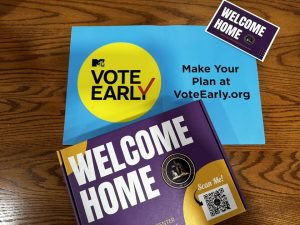
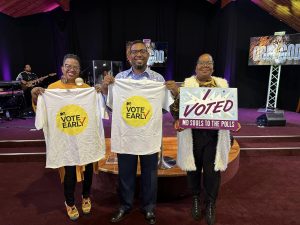
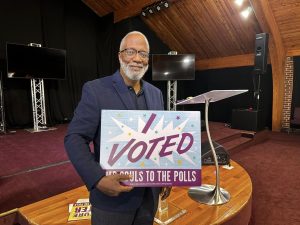
Photos from the United Black Clergy’s first round of Souls to the Polls on October 30. Photos courtesy of Antonio Palmer’s Facebook.